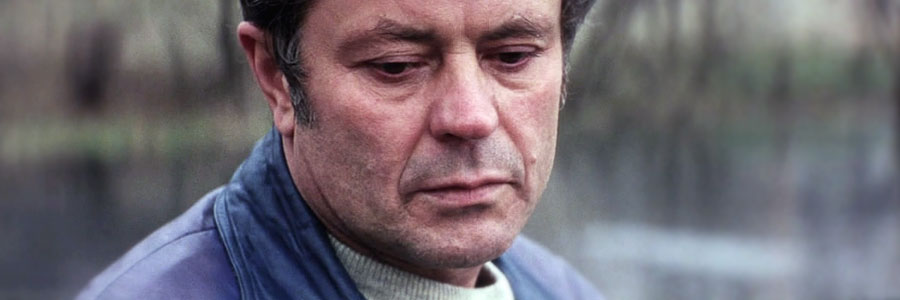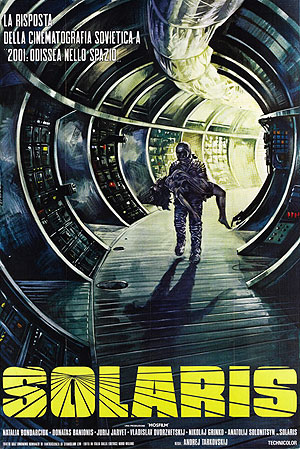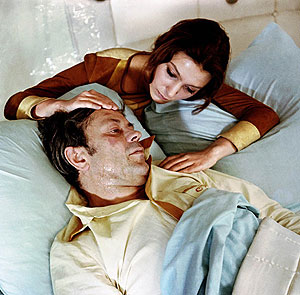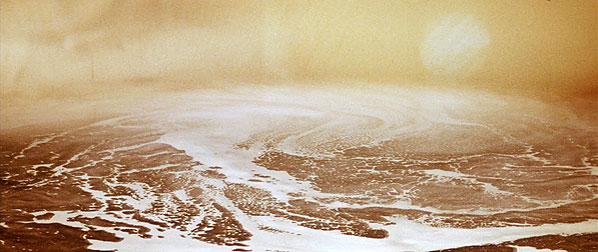
Solaris

SOLARIS (MOVIE)
Mosfilm Studios
Original release: 1972
Running time: 167 minutes
Original Language: Russian
Director: Andrei Tarkvosky
Writers: Fridrikh Gorenshtein, Andrei Tarkovsky and Stanislaw Lem
Composer: Eduard Artemiev
Cast: Donatas Banionis, Natalya Bondarchuk, Yuri Jarvet, Anatoliy Solonitsyn

It’s always struck me as odd that big philosophical questions were considered esoteric and head in the clouds, whereas concerns about daily matters were evidence of feet on the ground and level-headed sensibleness. I always thought it should be the other way around. The gas bill was ephemera, trivial compared to the meaning of existence. Or perhaps more accurately, I sort of thought all of these questions were related. ‘Why are we here?’ means ‘What are we having for dinner?’ And ’What’s on TV tonight?’ often goes hand in hand with a search for the meaning of life.
Andrei Tarkovsky is a director who ponders the deepest mysteries of our existence, but who at the same time knows the importance of whether you push a door to open it, or you pull. Solaris begins with a reminder that the Earth is an alien place if you look at it closely enough. The reeds that drift in a river move with something like sentient grace.
Kris Kelvin, a psychologist, starts his odyssey from his childhood home, the very Russian dacha of his aging father, to which he will eventually return. He’s to be sent on a mission to a space station in orbit above the oceanic planet Solaris. Something’s gone wrong on the station and, after decades of confusion and controversy, he’s to investigate what it is.
Kelvin already weighed down with his own problems and seems reluctant to offer his opinions as to the best course of action when visited by Henri Burton, a pilot who’s had experience of Solaris and who plays him films of the inquiry that eventually discredited him.
As Kelvin is set to leave, he looks at his familiar surroundings as if for the first time; at the beautiful meadows and the lake with the wistful misery of a man already missing them. Tarkovsky frames him so that we rarely see the sky in these opening scenes. He’s a man with his feet on the ground; at least for now.
He’s also a man who knows he’s effectively killing his father who’s unlikely to still be alive when Kelvin returns. He burns his mementoes, almost like an offering.
According to Stanislaw Lem, the Polish novelist on whose book the film was based, the director was intent on removing as much of the Science Fiction from the film as he could. Kelvin’s trip to the space station is a good case in point. Instead of showing a space ship moving across a star field, the trip is entirely implied by a series of shots of Burton driving through a futuristic cityscape (using Tokyo).

It’s almost as if the amassed urban transport somehow propels Kelvin the interstellar distances required. When Kelvin does arrive at the space station, it’s a wreck: not so much futuristic as grubby. There are computers falling apart, wires dangling and everything tilts at unintended angles. His friend Gibarian, is dead, apparently a suicide, but the two surviving scientist Doctors Sartorius and Snark are by turns unreliable, evasive, hostile and occasionally drunk.
Kelvin discovers the reason for their emotional disturbed states when he awakes next morning to find his long dead wife beside him.
She, it turns out, is somehow an emanation from Solaris, based on his memories, but at the same time she’s sentient and, as the film progressed, stakes her claim for being perhaps the most sympathetic human on the space station.
While the men, scheme to find a way to defeat, or somehow control the planet below them, her reaction is more thoughtful and nuanced. Her own emotions go from her initial puzzlement to something like love and, finally, to despair. Natalya Bondarchuk’s performance is wonderful, at once creepy and enigmatic and at other  times daringly familiar. The symposium of the scientists is interrupted by her insistent questions. ‘Don’t make a scientific problem into a simple love story,’ Dr. Sartotius tells Kelvin.
times daringly familiar. The symposium of the scientists is interrupted by her insistent questions. ‘Don’t make a scientific problem into a simple love story,’ Dr. Sartotius tells Kelvin.
There are deep questions about man’s relations to the cosmos, the nature of belief and what it means to be human, but Tarkovsky never loses sight of the human nitty-gritty. Kelvin is a grubby little man, a Lithuanian Rod Steiger, who’s content—there’s no pretty way of saying this—of wearing a string vest for long stretches of screen time.
The characters are aware of how this philosophising could become ‘second rate Dostoyevsky’ and when they pick up a book to seek solace it is the comic masterpiece of illusions of grandeur Don Quixote. Whereas the perfectly satisfying and workmanlike Soderburgh remake (Tarkovsky own film was the second adaptation of the novel; the first being a TV movie made in 1968) ties together the story with a nice twist, Tarkovksy leaves much hanging and his ending is deliriously open to interpretation.
Tarkovsky himself considered the film something of a failure and would return to the themes and the feel of the film with Stalker, arguably his masterpiece, which would take a Science Fiction premise, but rid itself of almost all generic trappings. Solaris remains, however, a major piece of work, which will have you pondering the mysteries of existence even as you start to wonder what’s for dinner.


John Bleasdale
John Bleasdale is a writer based in Italy. He has published on films at various internet sites and his writing can be found, along with blog posts, collected at johnbleasdale.com.
He has also contributed chapters to the American Hollywood and American Independent volumes of the World Directory of Cinema: (Intellect), Terrence Malick: Films and Philosophy (Continuum) and World Film Locations: Venice (Intellect). You can also follow him on Twitter @drjonty.
© 2022 STATIC MASS EMPORIUM . All Rights Reserved. Powered by METATEMPUS | creative.timeless.personal. | DISCLAIMER, TERMS & CONDITIONS
HOME | ABOUT | CONTACT | TWITTER | GOOGLE+ | FACEBOOK | TUMBLR | YOUTUBE | RSS FEED
CINEMA REVIEWS | BLU-RAY & DVD | THE EMPORIUM | DOCUMENTARIES | WORLD CINEMA | CULT MOVIES | INDIAN CINEMA | EARLY CINEMA
MOVIE CLASSICS | DECONSTRUCTING CINEMA | SOUNDTRACKS | INTERVIEWS | THE DIRECTOR’S CHAIR | JAPANESE CINEMA





